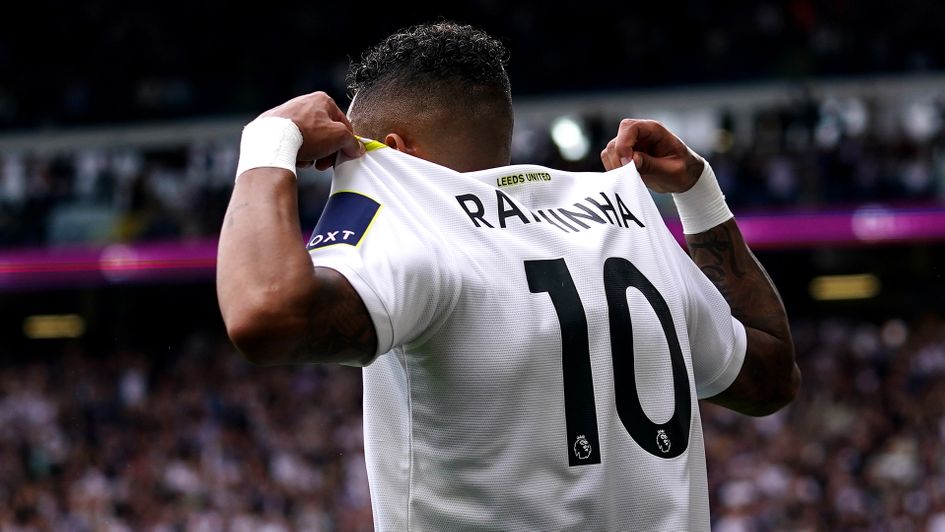
Raphinha could provide a bigger impact than Eden Hazard at Chelsea
Months of turbulence at Chelsea may have ended with the purchase of the club by a consortium led by Todd Boehly but that alone did not put an end to the anxiety.
Chelsea have felt ungrounded, nervously waiting to discover where they sit in the pyramid without Roman Abramovich’s billions.
The first major signing of the new era was always going to be a statement of intent and an important symbolic moment for the club. There is reason for optimism - and for relief - that reports indicate that signing will be Leeds United’s Raphinha.
Beating Arsenal and Barcelona speaks volumes, as does the price tag of around £55 million; a sizeable figure suggesting Chelsea will continue to look at top-tier players for the foreseeable future and can still outbid their key European rivals.
But the excitement around Raphinha goes far beyond the technical factors in the bidding war. Chelsea are about to sign exactly the kind of player Thomas Tuchel needs to deliver on the early promise he showed in the Champions League-winning season of 2020/21.
What went wrong for Chelsea last season?
Chelsea’s 2021/22 campaign unravelled long before the sanctions imposed on Abramovich.
It was a run of just four wins in 13 Premier League games between November and January that saw their expected challenge for supremacy with Liverpool and Manchester City fade away, and for that Thomas Tuchel will blame a sense of claustrophobia taking hold of a team playing within themselves.
The football seemed too structured, too static, not unlike the hesitant sideways possession we had encountered during Tuchel’s first few months in charge.
This was partly explained by the injuries to Ben Chilwell and Reece James, because without aggressive attacking wing-backs Tuchel’s 3-4-2-1 is too centrally focused (making it easy for opponents to stay narrow and slow everything down) and lacks penetration through the lines.
It was also a major problem that Romelu Lukaku, likely to leave this summer, struggled to adapt. But this does not entirely explain Chelsea’s problems – and Raphinha could be the solution to much of what went wrong.
Tuchel’s most common reaction to watching his side play is furiously throwing his arms from left to right in a signal to get the ball forward with greater urgency.
He has little interest in the prosaic possession football that so often grips Chelsea, instead demanding that his team play sharply in the transition to get behind an opposition defence and gallop with Germanic intensity into the final third.
That is inherently more difficult to do in England than it was at Borussia Dortmund, but it does not help that he possesses players who prefer to dance delicately between the lines making deft touches to one another, and indeed it is increasingly unclear how Kai Havertz and Mason Mount can operate together as Chelsea’s inside forwards.
This is where Raphinha, schooled by the ultra-direct Marcelo Bielsa at Leeds, can be such a game-changer for the club.
What impact will Raphinha have at Chelsea?
He is constantly looking to get on the ball in wide areas and drive directly at defenders, both drawing the opponent towards him and breaking lines all on his own.
It is a purposefulness that can elevate the intensity of his new team-mates, who will now more consistently have an out-ball to the right; someone to attempt incisive and goal-creating actions at every opportunity.
It is an attribute shared with Raheem Sterling, another Chelsea target that emphasises Tuchel’s desire to reintroduce the Eden Hazard-like brutal creativity from the flanks.
And Raphinha may be even more productive than Hazard.
He managed 11 goals and three assists for Leeds last season despite his team finishing 17th in the Premier League, and ranked joint tenth among all players for completed dribbles (1.8 per match) and key passes (1.9 per match).
Remarkably, those stats are better than any Chelsea player despite Tuchel’s team finishing 14 places and 36 points higher in the table.
That is a reflection of what Raphinha brings that no current Chelsea player can: an almost reckless unpredictability in his capacity to take risks and carry the ball forward.
According to FBRef, compared to all attacking midfielder and wingers across Europe in the last 365 days Raphinha is in the 90th percentile for progressive passes (5.22 per 90); he is always looking for a daring forward ball, and with so much talent in his left foot that danger will almost certainly raise the standards of those around him.
The Bielsa influence is also important from a defensive standpoint, with Raphinha in the 91st percentile for blocks and 79th percentile for interceptions.
He is a hard-working presser who will ensure the relentlessness Tuchel needs is always enacted no matter the phase of the play – once again helping turn Chelsea’s safe playing style into something more befitting Tuchel’s requirements.
It is certainly a better fit than Arsenal, even if Mikel Arteta’s use of Martin Odegaard, Bukayo Saka, and Emile Smith Rowe has seen the Gunners become more of a surging and vertical attacking prospect than we had been expecting.
Raphinha’s place in that side, with Saka excelling on the right last season, is unclear, while the huge influence of Pep Guardiola on Arteta means Raphinha would perhaps have been utilised in a more simplistic manner, much like Riyad Mahrez at Man City.
Raphinha to Chelsea is a perfect fit for both parties and a crucial first move of the new Boehly era.
If it is a sign of things to come, of an owner willing to back the manager with big signings, then Chelsea supporters can relax and begin to dream again of Tuchel delivering a Premier League title.